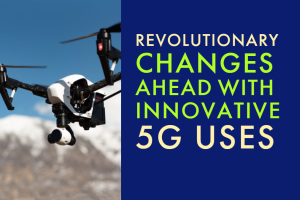Revolutionary changes ahead with innovative 5G uses

With 46 5G networks now deployed globally, 5G networks are expanding the value of wireless communications like never before. According to IHS Markit, up to $13.2 trillion (€11.9 trillion) worth of sales enablement and 22.3 million jobs will be supported by 5G by 2035.
To illustrate the increasing value of 5G uses, 5G Americas announced the publication of a white paper titled, 5G Service Innovation which identifies emerging services across a wide range of uses, including home broadband replacement, cloud gaming, smart utility grid enhancements, unmanned aerial vehicles, and others.
Chris Pearson, president, 5G Americas said, “5G is in the early phases of commercial deployment. However, we are already seeing a lot of work being done in some of the early use cases like the fixed wireless access and enhanced mobile broadband which are now a reality.”
The white paper presents a comprehensive introduction of the adoption and barriers in implementing 5G. It highlights detailed use cases that could serve as potential new revenue streams for enterprises and network providers. 5G Service Innovation highlights several key areas, including:
- Explaining end-to-end architectural aspects of each use case and the importance of 5G as a technology enabler
- Requirements and key performance indicators (KPIs) expected from the 5G component on each architecture
- Activities around the deployment of each use case
- Key issues that need to be addressed for each use case
In addition, 5G Service Innovation explores how 5G will use a wide array of available low, mid, and high spectrum bands and support licensed, shared and unlicensed spectrum to deliver new services. Spectrum diversity enables 5G to scale from traditional wide area, to enterprise and to indoor/outdoor hotspot deployments.
Said Pearson, “Once the full commercial capabilities of 3GPP Release 15 and 16 are deployed 5G, use case opportunities will increase immensely as new services and applications emerge in a new hyper connected world.”
With 1.3 billion 5G subscribers predicted as early as 2023, according to Ovum, there have been at least 21 potential unique 5G use cases identified that will affect productivity and enhance economic activity across a broad range of industry sectors.
The 5G Services Innovation white paper identifies some of these promising use cases, such as:
- Fixed Wireless Access (FWA): 5G FWA can serve a replacement for home or business broadband, eliminating the need for costly deep-fiber fixed access infrastructure deployment and offer connectivity solutions that can achieve 10 to 100 times more capacity than 4G networks.
- Cloud gaming: Cloud gaming represents a fundamental change in gaming because it shifts the computationally intensive graphics rendering and processing from the user’s device to network servers. 5G low latency connectivity enabled by edge servers will be required to deliver enhanced cloud gaming services on mobile devices.
- Smart grid: Two-way communication networks for the electricity grid will allow wirelessly connected devices to remotely detect, monitor and adjust electricity usage and power consumption. 5G will be a catalyst, allowing networks to provide the required throughput and ultra-low latencies essential for smart grid applications.
- Extended Reality (XR) – Augmented Reality (AR) & Virtual Reality (VR): 5G will provide renewed momentum towards expansion of the XR market. Extended reality (XR) applications are some of the most critical edge applications being developed by the industry.
- Non-Terrestrial Networks with 5G: The aerospace industry is on the precipice of a revolution as a result of innovation and investment in the areas of Low Earth Orbit (LEO) and High-Altitude Platform Station (HAPS) systems. LEO and HAPS systems represent a new opportunity for network operators to establish Non-Terrestrial Networks (NTN) to serve many different use cases that would otherwise be difficult with traditional earth networks.
- Unmanned Aerial Vehicles (UAVs): Ultra-low latency is a key requirement for 5G and coupled with robotics will usher in a new era of remote medicine, factory robotics, and drones – or Unmanned Aerial Vehicles (UAVs). 5G will enhance UAV capabilities and Traffic Management System (UTM) operations.
- Healthcare: Healthcare, specifically telemetry, is one of the leading IoT use cases expected to deliver the fastest spending growth over the 2017-2022 forecast period. New treatment devices will rely on the URLLC and time synchronisation capabilities of 5G to support accurate and timely information sharing and control. Tasks may range from sharing video to diagnostic purposes, to controlling an insulin pump or performing a robotic surgery.
Prashanth Hande from Qualcomm Technologies, Inc. and leader of the project stated, “5G technology will expand the value of mobile networks to take on a larger role than previous generations, empowering many new connected services across an array of world changing use cases.”
The paper is available for free download here.
Comment on this article below or via Twitter @IoTGN
